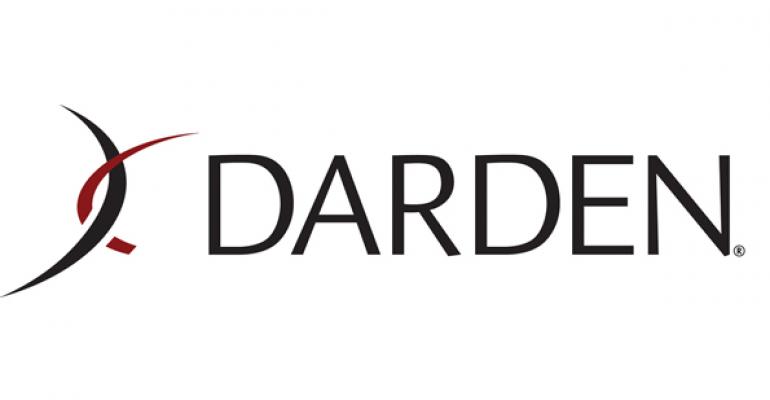Olive Garden’s same-store sales accelerated in the third quarter because the chain kept things simple.
That, at least, was the take from Gene Lee, CEO of the casual-dining Italian chain’s Orlando, Fla.-based parent Darden Restaurants Inc. Lee said the company’s focus on operations over the past year and more helped generated strong sales. Olive Garden’s same-store sales rose 6.8 percent in the third quarter ended Feb. 28.
“We’re just running better restaurants today,” Lee said during the company’s earnings call Tuesday. “I don’t think we should discount the importance of ensuring we’re properly staffed, our teams are properly motivated, simplifying the operation, reducing the size of the menu, processes and procedures.
“The overall experience inside an Olive Garden is significantly better than it was 12 to 24 months ago.”
At least part of Olive Garden’s strong sales were due to a calendar shift — on a comparable basis, the company said its same-store sales rose a more modest 4.9 percent.
Still, it was the chain’s sixth consecutive quarter of growth, and came despite a difficult market for casual dining. Olive Garden’s same-store sales were 600 basis points higher than the industry average outside of Darden.
The company has focused on bringing in to-go customers. To-go orders have grown more than 40 percent over the past two years, executives said, and now represent 10.5 percent of the chain’s total sales.
Olive Garden also added large-order delivery to its restaurants, a service that executives are watching closely. They believe it has considerable potential to drive sales, especially as the chain markets the service more heavily.
“We believe catering is a big opportunity,” Lee said. “The reception’s been fantastic. We benefit significantly at Olive Garden because food travels so well, especially when we put it in bulk containers. The consumer is very, very happy with the product. It’s unique. We believe this is a huge opportunity over time as we continue to build awareness.”
In addition, tablets the company added last year has also helped, and the chain is closing out checks seven minutes quicker, Lee said.
Olive Garden has focused on “everyday value” offerings with price points of $6.99 at lunch and $9.99 at dinner. Lee said that has enabled the company to focus on service while remaining competitive with the value customer. It gives the chain a higher perceived value, Lee said, especially with the improved service.
“One of the things we’re focused on now is trying to keep things simple,” Lee said. “Simple is hard. Doing simple things every day is really hard. That’s what’s given us the biggest lift at Olive Garden. We’re not relying on promotional activity to drive business.”
On a comparable basis, all seven of Darden’s restaurant chains reported same-store sales growth last quarter, ranging from 1.3 percent at Eddie V’s to 6.3 percent at Bahama Breeze, and including 2.7 percent at LongHorn Steakhouse.
The results were enough to push Darden to increase its same-store sales outlook for the current fiscal year to 3 percent to 3.5 percent growth.
That outlook suggests more moderate same-store sales for the rest of the company’s fiscal year, Baird analyst David Tarantino wrote in a note on Tuesday. Same-store sales for all Darden’s chains increased 4.2 percent on a comparable calendar basis. Tarantino said that slower same-store sales “could limit the potential for upside” on the chain’s earnings estimates.
Still, company executives said they believe the company would do well to finish with that level of same-store sales.
“When I think about our guidance, if we finish the year in the 3 to 3.5 [percent] range, that’s a great year for Darden,” Lee said. “It’s something we should be incredibly proud of.”
Lee also said that the current environment is “choppy,” and “continues to move around” week to week. “We’re trying to focus more on longer-term trends than what is happening week to week,” he said.
Higher sales are helping all of the company’s segments to generate higher profits. Profits at Olive Garden increased 9.3 percent in the third quarter, to $220.1 million, from $201.4 million the previous year. Segment profit increased 29 percent, to $85 million, from $65.9 million, the company said.
Despite the strong quarter, which included 6.7-percent revenue growth, to $1.85 billion, the company’s stock fell nearly 4 percent Tuesday. That might have been due to the resignation of the company’s chairman, Jeff Smith, CEO of activist investor Starboard Value LP, who had led an overhaul of Darden’s board in 2014.
Contact Jonathan Maze at [email protected]
Follow him on Twitter: @jonathanmaze





